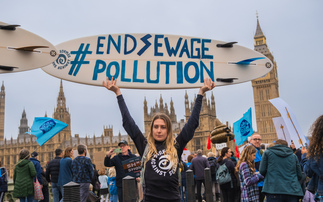Brexit presents an immense challenge and unique opportunity for green businesses - over the next fortnight BusinessGreen takes the microscope to the issues that will determine whether we get a Green Brexit
The temptation to stick your head in the sand and surface again in two, or perhaps five years' time is pronounced. We are not yet a year on from the referendum and two years of Article 50 negotiations stretch ahead with the promise of a transitional period and further talks beyond that. Already you get the sense many people are heartily sick of Brexit's all-spectrum dominance of the airwaves and the body politic, not to mention the increasingly intemperate nature of public discourse. Polls suggest a growing constituency just want politicians to get a move on with the most complex post-war undertaking British governance has ever embarked upon. Heaven knows what they'll think in two years' time; they'll probably be wanting to emigrate.
And yet for businesses ignorance is not bliss. With long term investments to plan and strategies to develop they cannot simply close their eyes and hope for the best as the UK embarks on a new economic era: there are too many challenges to navigate, as well as opportunities to seize.
This is particularly true for green businesses. By an unfortunate, or perhaps fortunate, coincidence, the Brexit project comes just as the green economy similarly embarks on an exciting new era.
As evidenced by the government's own statistics last week, UK carbon emissions have slumped 10 per cent in the past two years, as coal has been forced off the grid and clean energy technologies have demonstrated conclusively that they can deliver at scale and affordable cost. This trend is now set to continue and accelerate, as clean energy costs continue to fall, electric vehicles extend their range and viability, and energy efficiency technologies become mainstream.
After a decade of testing, tweaking, and demonstration, the low carbon economy is now embarking on a decade of mass deployment. By the time the Brexit process has fully shaken itself out - plenty of experts reckon it could take the best part of a decade - the UK should have a near fully decarbonised power system, millions of zero emission vehicles on the streets, and an emerging green heat, sustainable agriculture and low carbon industrial sectors.
This low carbon transition and clean tech revolution is global in its nature and as such will not be derailed by Brexit. But the key question for green businesses and investors is whether the biggest economic and political project undertaken by the UK since VE Day will hamper or aid the emergence of a genuinely green economy?
The truthful answer to this crucial question is no one knows.
There are certainly plenty of reasons to be pessimistic, which explains why the vast majority of sustainability executives and green professionals voted Remain.
Brexit has already had a negative impact on the UK's green economy in so much as it is the primary reason why the government's long-awaited Emissions Reduction Plan, 25 Year Plan for Nature and Air Quality Strategy have been repeatedly delayed. Billions of pounds of green infrastructure investment are on hold as developers await policy certainty that would almost certainly have been delivered by now if civil servants were not being swamped by Brexit.
Moreover, green businesses share the same concerns as the wider business community over the impact changes to the UK's trading status and immigration system could have on their operations.
And then there are the specific policy fears. Around 80 per cent of the UK's environmental legislation stems from Brussels and while the Great Repeal Bill promises a stable policy transition as we leave the EU, Ministers have also stressed that the government will be able to change any and all of these regulations in the future. Ideological opponents of environmental protections are visibly salivating at the prospect of a bonfire of green rules covering everything from energy efficient product standards to habitat protection.
But while it is crucial not to gloss over these entirely credible concerns, there are also reasons to be optimistic. The narrative being pushed by the more thoughtful Leave campaigners and adopted by the government's moderate wing is that Brexit presents a once-in-a-generation opportunity for much-needed national economic and cultural renewal. As Business Secretary Greg Clark keeps stressing, if Brexit gives the UK greater freedom and flexibility to build a modern, upgraded, competitive economy then by definition green businesses will need to be at the heart of that project.
There are opportunities here for modern, environmentally conscious, technologically savvy businesses to exploit the export opportunities Ministers promise Brexit will bring. There are opportunities to work with the government as it seeks to build a more activist state and create a 21st century skills base. There are opportunities to invest in the innovation and infrastructure the post-Brexit UK will desperately need.
Which vision will win out? The UK as a modern, low carbon, exemplar economy, marrying the best of European environmental policy with the can-do entrepreneurial swagger of the world's best clean tech innovation hubs? Or a pollutocrats' paradise, where green protections are torched, trade tariffs force companies to relocate, and the UK succumbs to depressing insularity?
Again, no one knows. But one thing is certain, to deliver the best case Brexit green business leaders will need to play a visible and dominant role in the UK's reshaped economy. They will have to remain fully engaged with the Brexit debate, soul-destroying as it may appear at times, and fight hard to protect and enhance effective environmental policies and programs. And they will have to keep on top of the detail and the implications of some of the most complex political negotiations ever attempted.
That is why over the next two weeks - and the next two years - BusinessGreen is launching a special series to explore some of the issues arising from Brexit that present the biggest challenges and the most exciting opportunities for the green economy.
We've spoken to experts from across multiple industries, dug into the detail of some of Europe's most complicated environmental policies, and explored the ramifications of some of the knottiest issues faced by the UK and EU negotiating teams.
Over the next two weeks, we'll be reporting on what UK-EU trade talks mean for green businesses, what will happen to air quality rules, the future of the emissions trading scheme, how the natural world will be impacted by Brexit, the prospects for the UK's green skills base, the prospects for the clean energy industry, hopes for the circular economy, and many other issues.
We hope you enjoy the coverage, find it useful, and most of all resist the temptation to stick your head in the sand as this new era for the UK's vibrant green economy gets underway.










